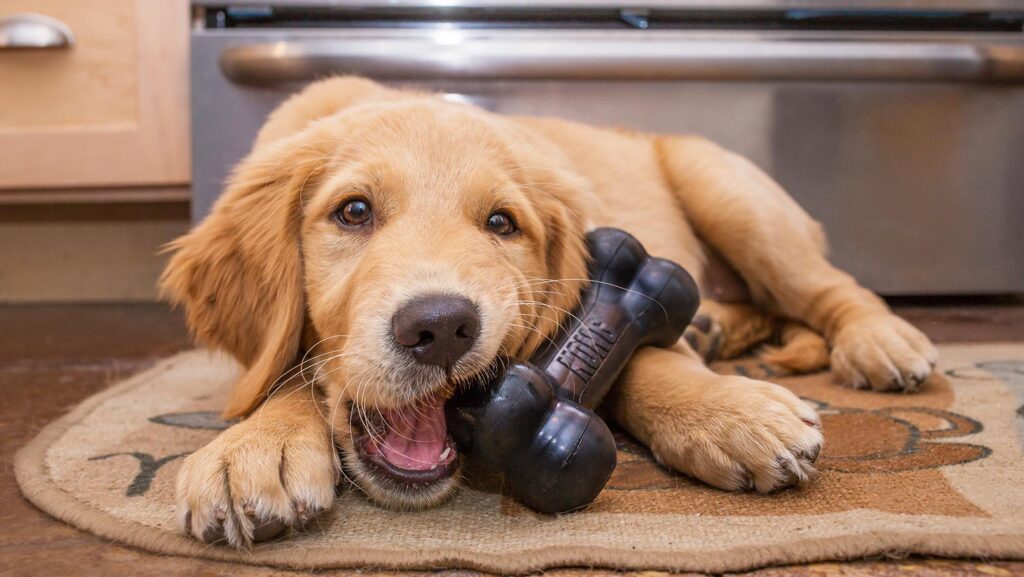How Much Does a Dog Cost in 2025?

Photo by Chewy
Loving your furry BFF don’t cost a thing. But owning a dog sure does—potentially tens of thousands of dollars across their lifetime.
So, just how expensive are dogs? We’re breaking it down:
Bottom line: A dog is a significant expense, and you’ll want to make sure you can afford to keep them happy and healthy all their days. After all, they so deserve it. (And having a budget for your new dog is part of being a responsible pet parent.)
Here’s a look at all the costs involved to help you plan.
Key Takeaways
- The initial cost of buying a dog averages $780-$7,000.
- The annual cost of caring for a dog averages $885-$3,410.
- Altogether, the lifetime cost of having a dog can be $13,000 or higher.
How Much Does It Cost to Adopt or Buy a Dog?
Bringing a dog into your life involves some larger expenses up front. Let’s go over some of the initial costs you should expect to cover.
Common Costs of Bringing Home a New Dog
| Expense | Estimated Cost |
| Adoption fee | $50-$500 |
| Breeder fee | $800-$4,000 |
| Veterinary costs | $400-$1,250 |
| Start-up pet supplies | $300-$1,200 |
| Microchip | $15-$75 |
| Training | $180-$840 ($30-$140 per session at 6 sessions on average) |
| TOTAL: | $1,745-$7,865 |
Adoption Fee
If you adopt a dog from a shelter or rescue, the organization will charge an adoption fee to help cover some of the costs associated with holding the animal and getting them ready for adoption. Those costs often include spay or neuter surgery, microchipping and vaccines.
Adoption fees can range considerably; some purebred or less common dog breeds might have higher demand, which translates to higher fees. The same is true of older or special needs dogs that require more medical care prior to adoption.
Typically, adoption fees can be anywhere from $50 to $500, or even more.
Pro Tip: Keep an eye out for adoption events and promotions where the adoption fees are waived or heavily discounted.
Breeder Purchase Fee
Millions of adoptable dogs end up in U.S. shelters each year, but if you choose to buy from a reputable breeder, the dog price can vary more widely, from the high hundreds to several thousand dollars, according to Dr. Jerry Klein, DVM, chief veterinary officer for the American Kennel Club.
Again, the breed and its popularity will have a big impact, though buying a dog from a breeder is usually much more expensive than adoption.
“Sometimes they charge thousands of dollars for them, because there’s just a market for them,” he explains.
For instance, a breeder may charge up to $1,500 or more for a Beagle puppy, while an English Bulldog costs upwards of $3,000, on average. That fee should include certain benefits, including documentation of their pedigree, certification of good health, and an even temperament that’s matched to the family.
While many breeders really care about the puppies they sell, buyers should beware of “puppy mills,” which are run by unscrupulous breeders uninterested in the health or welfare of the animals.
“These puppies suffer from a wide variety of physical and behavioral challenges,” says , according to Julie Castle, CEO of Best Friends Animal Society. “This is both inhumane and, since we’re talking about cost, could wind up costing you a tremendous amount of money in vet and training bills.”
As responsible pet parent, it’s up to you to do your homework to ensure you are purchasing from a reputable breeder.
Vet Costs
Some medical dog expenses might be covered by the organization you buy or adopt from, as noted above. It’s fairly common to have spay/neuter surgery and vaccines taken care of before the dog is available, which are rolled into the adoption fee.
If these are not covered prior to bringing your dog home, you’ll be responsible for these costs:
- Vaccines: $70–$180 for core vaccines
- Flea and tick preventatives: $15–$100 per dose
- Spay/neuter surgery: $200–$700
- Initial veterinary exam (not including vaccines): $60–$100
However, depending on the age of the dog, you may still need to follow up with additional wellness exams, vaccines, and more within the first few months.
“The first year of life is probably going to be the most expensive,” Dr. Klein says. That’s because you’re providing your new fur baby with the veterinary care they’ll need to grow into happy, healthy adults. This initial investment helps set them up for future success.
In fact, a puppy requires around $480 to $2,400 in veterinary care during their first year Healthy adult dogs, on the other hand, might only require routine annual care (more on that later).
Supplies
It’s time for the fun part: Shopping! Preparing for your new dog to come home means stocking up on all the products necessary to give them the very best care (plus some fun extras, too).
Items on your shopping list will probably include:
- Dog food and treats
- Food and water bowls
- Collar and ID tag
- Leash
- Poop scoop and pet waste bags
- Dog crate
- Dog bed
- Toys
- Grooming products, such as shampoo, brush and nail trimmers
- Training tools, such as a dog clicker
- Medications and supplements, such as flea prevention and calming chews
- Cleaning supplies for messes (because they’re going to happen!)
In general, you can expect to spend a few hundred dollars to get your dog set up. Again, the cost of these start-up supplies can vary quite a bit, depending on the brand and where you buy them. For example, Chewy offers 35% off for all first-time Autoship customers.
Microchip
Many animal shelters will microchip pets upon adoption. If your dog has not been microchipped, you should talk to the vet about having it done. (The procedure involves inserting under your pup’s skin a little chip that can be used to find your contact information).
Sadly, approximately 10 million pets are lost or stolen in the U.S. every year. Even sadder? Only about 15% of dogs in shelters without microchips or ID tags are reunited with their owners.
Microchipping is an easy way to prevent such a tragedy. It typically costs $150 to $100 to have the microchip inserted and registered. Some microchip companies offer annual memberships that include additional recovery services for around $20 a year.
Training
Once your new dog is home, watch and observe how they are acclimating. Whether you’re bringing home a new puppy who needs to learn basic obedience skills, or an older, shy shelter dog who needs help feeling calm and confident around others, a professional trainer may be in order.
The cost of hiring a dog trainer depends on their experience, location, and the type of training required. It also makes a difference whether you attend group training classes or hire someone to work with your pup one-on-one.
In general, dog training classes cost between $30 and $80 per session, while private sessions cost around $140 per session. The typical puppy training class is 6 weeks long (one class per week).
How Much Does a Dog Cost Per Year?
In addition to the initial investment of bringing a dog into your family, there are also regular expenses you can expect to pay every year. These can cost an estimated $1,937, although they will vary based on your dog’s size and breed.
Let’s take a closer look at some of the common annual expenses you should plan for when getting a dog.
Estimated Annual Costs of Owning a Dog
| Expense | Estimated Cost |
| Food | $200-$720 |
| Routine vet visits | $300-$2,000 |
| Pet insurance | $600-$1,200 |
| Toys and accessories | $100+ |
| Grooming | $40-$5,000 |
| License | $5-$95 |
| Miscellaneous | $35-$65 |
| TOTAL: | $1,280-$9,180 |
Food
It’s important to feed your dog a healthy diet, so that means investing in high-quality dog food and treats.
Food costs can range anywhere from $200 per year for a small dog to $720 per year for a large dog. Certain premium brands, types of freshly made food or special vet-prescribed diets can cost even more, well over $3,000 for the year (again depending on the brand and the size of the dog).
Vet Visits
Staying up to date on routine veterinary care will ensure your dog lives a long and healthy life.
“Just like with humans, preventative care like having annual checkups cost a lot less than treating an illness,” Castle says.
That means you should plan to pay for routine wellness checkups once or twice a year, which may involve lab tests, X-rays, vaccines and more.
Routine vet visits could cost between $300-$2,000 a year, depending on the clinic, type of dog, and where you live.
That doesn’t factor in additional expenses related to emergencies or medications your vet may prescribe. Dr. Klein also notes that the bigger the dog, the more you’ll need to spend in this area, too, since higher doses of certain medications are needed for bigger animals.
Pet Insurance
Like healthcare for humans, veterinary care can be expensive. Between preventative exams, medications, visits for illnesses or injuries, etc., you could end up paying thousands.
That’s why buying pet insurance can be a good idea, especially if you have a breed that’s prone to health issues. There are many coverage options available with different levels of care included, from basic pet wellness plans for check-ups and preventative care, to more robust (and expensive) plans.
For example, according to CarePlus provider Lemonade, the average premium for puppies and kittens is $30 a month.
Toys and Accessories
Keeping your pup comfy and entertained should absolutely be a priority. Providing proper enrichment via dog toys and other gear can help keep behavior problems at bay—a bored dog will find their own form of entertainment. But this is one area where you have a lot of flexibility in how much you spend.
“You can go crazy with pet accessories these days,” Castle says. “From outfits, to fancy bowls, to elaborate dog houses and beds—you name it, it’s out there. But none of these are necessities.”
It’s up to you to set a reasonable budget for these types of items. The average person, however, can expect to spend around $100 per year.
Grooming
Dogs need grooming as a part of basic health maintenance, and the level of grooming they need depends on the breed.
For breeds with short hair, “it can be a simple bath … so all you’re looking at is the cost of dog shampoo,” Castle says. Pet shampoo can cost around $20.
For longer-coated dogs, such as Poodles or Afghan Hounds, grooming can be a lot more complicated.
“Keeping fur out of their eyes (and out of the other end) and keeping them free from matts and tangles—which can be really uncomfortable—is important,” Castle says.
On the high end, you could shell out up to $5,000 per year on frequent trips to a professional groomer.
License
In addition to a microchip and pet tag, it’s important (and often legally required) to register your dog with your city, county, or state and obtain a license that they wear.
If your pup gets loose, a dog license proves that they’re vaccinated and makes it easier to track you down. Plus, a portion of the fees—which run about $5-$95 a year—often go toward supporting local animal control and shelters.
Miscellaneous
The ASPCA estimates that other miscellaneous costs, such as extra cleaning supplies for pet messes or doggy waste bags, average $35 for small dogs, $45 for medium dogs, and $65 for large dogs annually.
Estimated Cost of Owning a Dog Per Month
Looking at a year’s worth of dog expenses can be daunting. We’ve broken it down by month to make budgeting easier.
| Expense | Estimated Cost |
| Food | $6-$25 |
| Pet insurance | $50-$100 |
| Toys and accessories | $8+ |
| Grooming | $0-$115 |
| TOTAL: | $64-$248+ |
Miscellaneous Dog Expenses to Keep in Mind
Dog Sitter and Boarding
If you like to travel, there may be times when you want to go out of town, but don’t have a friend or family member to watch your pet. In that case, you’ll either need to board your dog or hire a pet sitter to stay in your home and take care of them.
Boarding costs an average of $40 per night, with rates ranging from $25 to $85, according to HomeGuide. Luxury overnight hotels charge $75 a night and up. Hourly pet sitter rates may range from $12 to $20 per hour, according to Care.com.
At the very least, you might need someone to stop by once in a while when you’re busy at the office and take Fido out for a potty break. Dog walkers charge an average of $12-$30 an hour.
Emergencies
Even if you have pet insurance, it’s possible for your dog to end up with an illness or injury that requires care that isn’t fully covered. For that reason, it’s important to start an emergency fund and put money aside every month.
Personal finance website FinanceBuzz looked at the most common dog surgeries and the average costs of performing them:
- CCL (ACL) surgery: $1,000 to $3,000 per knee
- Cataract surgery: $2,600 to $4,000
- Herniated disc: $1,500 to $4,000
- Hip replacement: $3,500 to $7,000 per hip
- Intestinal blockage surgery: Up to $7,000
- Stomach flip surgery: $1,500 to $7,500.
As you can see, emergency vet bills for a dog can be just as pricey as for humans, so it pays to be prepared and have extra funds set aside just in case.
Senior Care
As dogs reach their senior years, there tend to be more costs associated with specialized care.
“If you find that your dog does have to go to a specialist—for example, it has a cataract or a heart murmur—the cost of seeing specialty veterinarians can be very expensive,” says Dr. Klein.
Specialized care senior dogs may require (and their estimated costs*) include:
- Cataract Surgery: $2,600-$4,000
- Abdominal ultrasound: $250-$1,000 per visit
- CCL repair: $1,000-$3,000
- Tumor removal: $200s-$1,000+
- Radiation therapy: $2,000-$6,000
- Dental cleaning: $150-$3,000+
- Chemotherapy: $200-$5,000 but could reach $10K or more. Treatment typically runs several weeks to 6 months, and additional costs usually include repeat bloodwork prior to treatment to verify that chemo is safe to administer at each visit, antinausea medications, etc.
- Cardiac consultation/echocardiogram: $200-$300 (consult) plus $600+ (echocardiogram). For most dogs under the care of veterinary cardiologist, this type of testing may need to be repeated 2-3 times per year, but initial consult fees should only apply to the first visit.
- Bloodwork: $100-$200 per visit. Most geriatric patients on chronic medication should be getting repeat bloodwork done 2-3 times yearly depending on the underlying medical condition(s) being treated.
*Note: Costs vary depending on factors such as severity of condition, whether a general practitioner or a specialist is providing the care, practice location, size of dog, etc.
Once your dog reaches senior status, it’s important for them to see a vet twice a year since there’s a higher chance of developing health issues. By seeing a vet early and often, and performing preventive measures like blood analysis and X-rays, you can more easily catch and treat problems such as arthritis, digestive issues, and weight gain.
You might also need to buy special equipment to help senior dogs get around easier. For instance, stairs or a ramp can help an older dog get onto the couch or into the car without having to jump.
They might also require special toys for sensitive teeth, or doggy diapers if they’re incontinent.
End of Life Care
Of course, there’s the one part of owning a dog that everyone hates: saying goodbye. But as a dog parent, it’s your duty to continue providing your fur baby the same level of care and attention up until their last breath.
Some people experience sticker shock on top of an already emotionally draining process. So it’s helpful to know how much euthanasia can cost, depending on how you go about it.
Here’s how much you can expect to spend for the service at the vet’s office, on average:
- Independent vet offices: $120-$130
- Large chain vet hospitals: $55+
- Emergency vet hospitals: $150-$250
Alternatively, some people choose to have the process take place in their home, where the family can be with their pet in the lowest-stress environment possible. If you go this route, you may pay $350-$900.
There is also the pet’s aftercare to think about. You might choose a private cremation, which starts at $100 for small pets. Larger animals, specialty urns, or other add-ons can increase the costs.
Opting for a communal cremation saves a bit of money, and starts at $50.
If you decide you want your beloved family dog buried in a cemetery, expect to spend $500-$1,500.
Factors That Affect the Cost of Dog Ownership
Depending on certain factors, caring for a dog can be more or less expensive.
Size
A larger dog is generally more expensive than smaller dogs: They’ll eat more food, require higher doses of medications, and use larger (and often pricier) beds and toys than smaller pups.
Breed
Certain dog breeds require special care, like extra grooming services for long haired pups. Others are more prone to certain health conditions, like Bulldogs and brachycephalic airway syndrome.
Plus, rare or especially popular breeds tend to cost more to purchase from breeders.
Age
Care for puppies and senior pets typically costs more than for adult dogs in their prime.
Puppies need initial vaccines, microchips, spay/neuter surgery, and training, which can make the first year of their lives expensive.
Senior pets may have higher vet expenses due to age-related conditions and may need specialized food or supplements.
Location
Where you live can influence the cost of goods and services—pet expenses included.
In urban areas with a high cost of living, vet care and services like grooming, pet-sitting, and dog-walking are typically more expensive than in rural areas.
If you’re looking to make a new pooch part of your family, don’t be daunted by these numbers. But do consider them carefully.
“Before you get a dog, make sure you can afford it,” Dr. Klein says. “You want to make sure you make a commitment for the life of that animal.”
With a solid pet budget and some planning, you can make the costs of owning a dog work. Just be sure to consider factors such as the breed, age, size and activity level of a potential pup before making a decision as these can greatly impact the expense. And remember that regular veterinary care and pet insurance can keep your dog’s lifetime health costs down.



